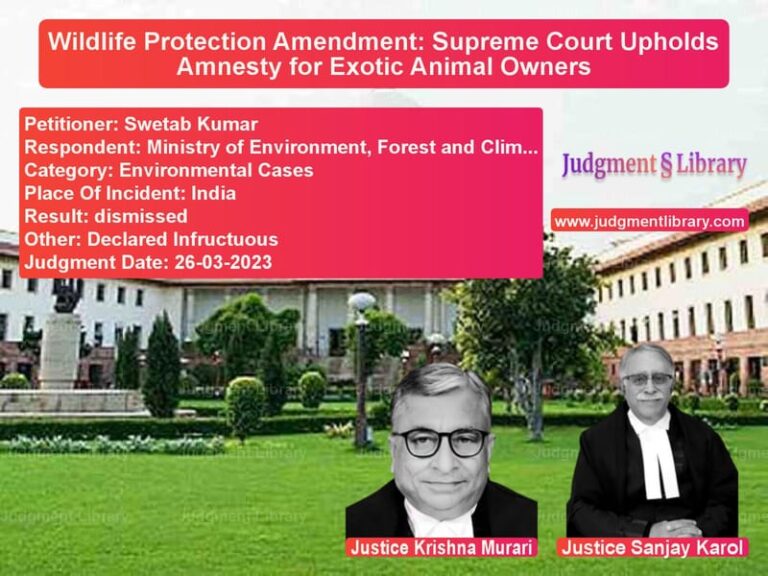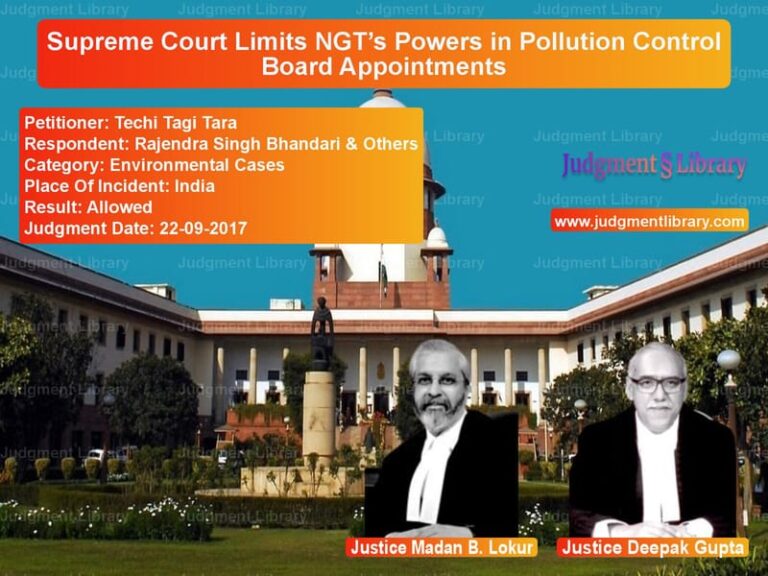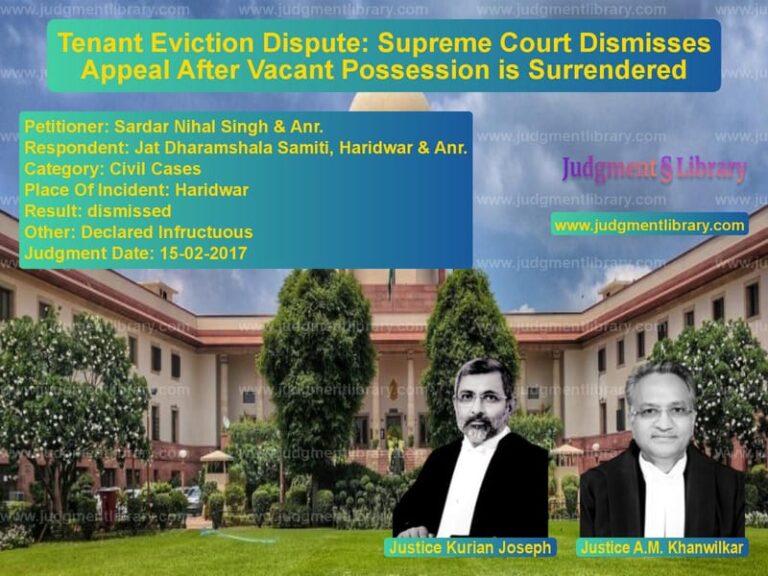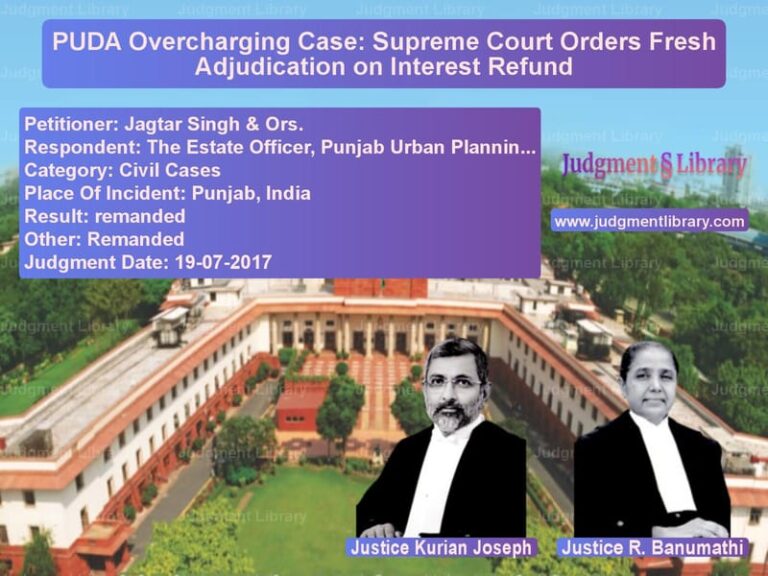Supreme Court Clarifies Default Bail Under Section 167(2) CrPC Amid COVID-19 Lockdown
The case of S. Kasi vs. State Through Inspector of Police examined whether the Supreme Court’s suo motu order dated 23.03.2020, extending limitation periods due to the COVID-19 lockdown, affected the accused’s right to statutory bail under Section 167(2) of the Code of Criminal Procedure (CrPC). This judgment reaffirmed the fundamental right to personal liberty and emphasized that procedural delays by the prosecution cannot override statutory protections.
Background of the Case
The appellant, S. Kasi, was arrested on February 21, 2020, in connection with a case under Sections 457, 380, 411, and 414 of the Indian Penal Code (IPC). He remained in judicial custody, but the prosecution failed to file a charge sheet within the prescribed 60-day period as mandated under Section 167(2) CrPC.
Seeking default bail, the appellant approached the Madurai Bench of the Madras High Court, which rejected the plea, reasoning that the Supreme Court’s suo motu order extending limitation due to the pandemic also applied to the statutory period for filing a charge sheet. This led to the present appeal before the Supreme Court.
Petitioner’s Arguments
The appellant, represented by Senior Counsel Sidharth Luthra, argued:
- The High Court erred in extending the statutory period under Section 167(2) CrPC, as the Supreme Court’s suo motu order applied only to limitation periods for filing petitions and suits, not procedural safeguards under criminal law.
- The failure to file a charge sheet within the prescribed time automatically conferred an indefeasible right to bail under Article 21 of the Constitution.
- Section 167(2) was enacted to prevent prolonged detention and ensure timely filing of charge sheets; extending it indefinitely would set a dangerous precedent.
Respondent’s Arguments
The State, represented by Additional Advocate General Jayanth Muthuraj, countered:
- The pandemic created an extraordinary situation that disrupted normal judicial processes, including police investigations.
- The Supreme Court’s suo motu order extending limitation should be read broadly to include time limits prescribed under Section 167(2) CrPC.
- Granting bail under these circumstances would be unfair to the prosecution, which faced logistical challenges due to the lockdown.
Supreme Court’s Observations
The Supreme Court analyzed the legal position and made the following observations:
- “The Disaster Management Act or lockdown orders cannot override statutory protections guaranteeing personal liberty.”
- The suo motu order dated 23.03.2020 was intended only for filing of petitions, suits, and appeals, not criminal proceedings involving the right to liberty.
- “The right to default bail is not merely statutory but a fundamental right under Article 21 of the Constitution.”
- The police could have filed a charge sheet digitally or sought an extension under applicable legal provisions instead of relying on the lockdown as an excuse.
Final Judgment
The Supreme Court ruled in favor of the appellant and issued the following directives:
- The appellant was entitled to default bail as per Section 167(2) CrPC.
- The High Court’s judgment was set aside for incorrectly applying the Supreme Court’s suo motu extension of limitation.
- The appellant was to be released on furnishing a personal bond of Rs. 10,000 with two sureties.
Implications of the Judgment
This ruling has far-reaching consequences:
- Clarification on Default Bail: Ensures that procedural delays cannot be used to curtail an accused’s fundamental rights.
- Limitation on Suo Motu Orders: The Supreme Court made it clear that suo motu orders extending limitation do not apply to criminal investigations.
- Judicial Accountability: Reinforces that courts must uphold statutory safeguards even in extraordinary circumstances like the pandemic.
Conclusion
The Supreme Court’s decision in this case underscores the importance of default bail under Section 167(2) CrPC as a fundamental protection against arbitrary detention. By rejecting the High Court’s erroneous interpretation of its suo motu order, the Supreme Court has reaffirmed that procedural delays by the prosecution cannot override the constitutional right to personal liberty. This judgment serves as a crucial precedent in upholding due process and ensuring timely judicial interventions in cases of unlawful detention.
Petitioner Name: S. Kasi.Respondent Name: State Through Inspector of Police.Judgment By: Justice Ashok Bhushan, Justice M.R. Shah, Justice V. Ramasubramanian.Place Of Incident: Madurai, Tamil Nadu.Judgment Date: 19-06-2020.
Don’t miss out on the full details! Download the complete judgment in PDF format below and gain valuable insights instantly!
Download Judgment: S. Kasi vs State Through Inspec Supreme Court of India Judgment Dated 19-06-2020.pdf
Direct Downlaod Judgment: Direct downlaod this Judgment
See all petitions in Bail and Anticipatory Bail
See all petitions in Custodial Deaths and Police Misconduct
See all petitions in Judgment by Ashok Bhushan
See all petitions in Judgment by Mukeshkumar Rasikbhai Shah
See all petitions in Judgment by V. Ramasubramanian
See all petitions in allowed
See all petitions in Quashed
See all petitions in supreme court of India judgments June 2020
See all petitions in 2020 judgments
See all posts in Criminal Cases Category
See all allowed petitions in Criminal Cases Category
See all Dismissed petitions in Criminal Cases Category
See all partially allowed petitions in Criminal Cases Category







